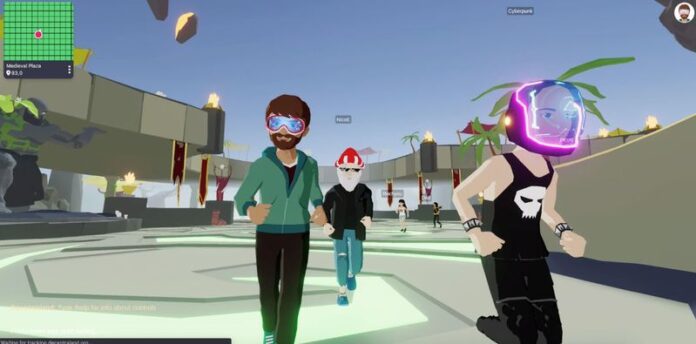When Barbados, population 287,370, opens its next embassy, almost anyone on the planet will be able to knock on the door.
The diplomatic compound is being built in Decentraland, an online world, or metaverse, accessible through a computer and a virtual reality headset.
Skeptics take note: A plot of virtual real estate in Decentraland recently sold for $2.43 million. Gucci, Christian Dior and Ralph Lauren are selling virtual clothing in 3D worlds. The crypto asset management firm Grayscale estimates the metaverse is “a trillion-dollar revenue opportunity.”
So a virtual embassy-row seems inevitable, said Gabriel Abed, the man behind Barbados’ digital-diplomacy push.
“This is going to change the way the world works,” Abed, 35, said in a telephone interview from Dubai, where he’s Barbados’ real-world ambassador to the United Arab Emirates. “The embassy is a small thing. The big thing is what governments can do together when land is no longer physical land and limitations are no longer part of the equation.”
Even before Facebook changed its name to Meta in October, the so-called metaverse was growing quickly.
In broad strokes, a metaverse is an online and immersive environment where people can interact in real-time through avatars. Decentraland allows users to buy and sell digital art and virtual parcels of land, or attend virtual-world music festivals with real-world acts.
But Abed said the metaverse also has more serious implications for small, deeply indebted nations like his.
“This is about diplomatic parity. We simply cannot support 197 diplomatic missions around the world,” he said. “We recognize that we’re a 166-square mile island — we’re tiny — but in the metaverse we’re as large as America or Germany.”
Barbados’ diplomatic compound will likely cost anywhere from $5,000 to $50,000 to build, but all the expenses are being covered by a “five-figure” grant from Decentraland. Other users on the site have also offered to donate land, he said.
“The cost is not too bad,” he said. “It’s a fraction of what a physical embassy costs.”
Emails to Decentraland seeking comment were not immediately answered.
The project is also about keeping the Eastern Caribbean island connected to global tech, Abed said.
“You don’t want to be introducing the internet to your citizens in the year 2021,” he said. “Similarly of the metaverse, you don’t want to wait until 2030, when this thing is part of everyday social interaction, to start explaining it.”
The announcement that Barbados was poised to open the world’s first metaverse embassy earned the island reams of glowing press ahead of Nov. 30, when it ditched Queen Elizabeth II as its symbolic head of state and became the world’s newest republic.
It’s no surprise that the Caribbean is leading the digital diplomacy push, said Cleve Mesidor, public policy adviser at the Blockchain Association, an industry trade group based in Washington, D.C.
Bermuda has been actively pitching itself as a blockchain and crypto hub since 2018. Bahamas launched the world’s first central bank digital currency, or CBDC, in 2020 -– just weeks ahead of the Eastern Caribbean Central Bank.
“There has always been healthy competition in the Caribbean when it comes to embracing new technology,” Mesidor said.
The Caribbean and Western Atlantic includes more than 30 nations and territories that make it fertile ground for “regulatory arbitrage” – island hopping in search of governments open to innovation, she said.
As Abed put it, “When one government says ‘no,’ you get on a plane and fly 10 minutes over to the next island.”
Abed seems well suited to be one of the world’s first digital diplomats. After graduating from the University of Ontario, where he studied cyptographics and network security, in 2013 he co-founded Bitt, a financial software company that helped Barbados and the Eastern Caribbean Central Bank create their digital currencies. The company is currently helping the Central Bank of Nigeria — Africa’s largest economy — launch its own central bank-backed digital currency, the eNaira. He’s also the founder of Digital Asset Capital Management, which, as its name implies, handles digital assets for institutional investors.
Abed said the success of Barbados’ embassy could ultimately depend on other nations joining in, so his government is actively sharing everything it’s learning about the metaverse experience with others.
This isn’t the first time there have been embassies in the metaverse: Sweden and Estonia opened virtual embassies in Second Life — a Decentraland precursor — at the turn of the millennium without shaking up the world order.
“Can it fail? There’s a probability of that. Can it succeed? There’s a bigger possibility of that,” Abed said of the experiment. “But as a nation we’re looking at pioneering and re-imagining our future. So we have to try these new things.”
https://www.bloomberg.com/news/articles/2021-12-14/barbados-tries-digital-diplomacy-with-planned-metaverse-embassy








